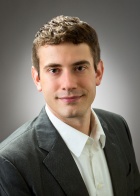Matthew J. Paszek
Assistant Professor
Cornell University
Smith School of Chemical and Biomolecular Engineering
Live broadcast available:
ZOOM Link
PW: UBCBE1
Mucin biopolymers: an Achilles heel of cancer and an opportunity for biotech
Membrane mucins are a family of sequence-specific polymers that are densely grafted to the surface of most cancer cells, forming a soft structure referred to as the glycocalyx. In this talk, I will discuss how mucins and the glycocalyx physically protect cancer cells from attack by immune cells, and how immune cells can be engineered to overcome this barrier. Natural Killer (NK) cells are frontline defenders of the human immune system that guard against cancer by eliminating transformed or otherwise compromised cells. Employing cellular engineering strategies and state-of-the-art imaging approaches, our group has shown that cancer cells can modulate their glycocalyx thickness by as little as 10 nanometers to significantly change their susceptibility to NK cell attack. I also will discuss how NK cells can be transformed into more effective “living drugs” by equipping them with an ability to enzymatically digest mucins and breach the glycocalyx barrier of cancer cells. While mucins present a barrier in cancer immunotherapy, recombinant mucins represent a largely untapped class of polymeric building block for biomaterials, therapeutics, and other biotechnology. In the final part of our talk, I will discuss our progress in the design and production of engineered mucins for applications ranging from bio-lubrication to improved cell-based manufacturing.
ZOOM Link
PW: UBCBE1
Bio
Dr. Matthew J Paszek is an Associate Professor and Director of Postdoctoral Studies in the Robert Frederick Smith School of Chemical and Biomolecular Engineering at Cornell University. The work of his group combines concepts and approaches in engineering, synthetic biology, and glycoscience to understand human disease and develop new biotechnology. This work has been recognized and supported by multiple awards, including the NIH New Innovator and NSF CAREER awards. Prior to Cornell, Dr. Paszek investigated the mechanobiology of cancer under the mentorship of Drs. Daniel Hammer and Valerie Weaver at the University of Pennsylvania, where he obtained his Ph.D. Dr. Paszek expanded on his graduate studies as a Postdoctoral fellow at the University of California, San Francisco, during which time he developed new methods for nanoscale cellular imaging and identified new biophysical mechanism underlying the regulation of cell-surface receptors in cancer.
Wednesday, September 14, 2022
- Time: 11:00 AM
- Location: 206 Furnas Hall
- Seminar Flyer

Matthew J Paszek
Assistant Professor
Smith School of Chemical and Biomolecular Engineering
Cornell University